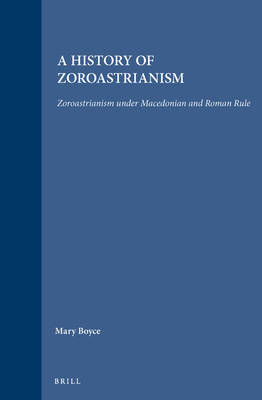
- Afhalen na 1 uur in een winkel met voorraad
- Gratis thuislevering in België vanaf € 30
- Ruim aanbod met 7 miljoen producten
- Afhalen na 1 uur in een winkel met voorraad
- Gratis thuislevering in België vanaf € 30
- Ruim aanbod met 7 miljoen producten
Zoeken
€ 520,95
+ 1041 punten
Omschrijving
This volume traces the history of Zoroastrianism at times and places where its existence has previously been largely ignored, or treated only episodically. Literary, archaeological and numismatic evidence has been drawn on (some of it only recently brought to light), and local developments are distinguished.
In Iran itself some 200 years of Macedonian rule had little effect on the national religion. To the east, Zoroastrianism survived in the Greco-Bactrian kingdoms and under Mauryan suzereinty, where it came into contact with Buddhism. In Eastern Mediterranean lands it was maintained by Iranian expatriates well down into Roman imperial times. They adopted Greek for their written tongue, and Zoroastrian doctrines thus became known in the Greco-Roman world.
Study is made accordingly of Zoroastrian contributions to Hellenistic thought, and to Judaism, Christianity and Mithraism; and an excursus provides a thorough reassessment of the Zoroastrian pseudepigrapha.
In Iran itself some 200 years of Macedonian rule had little effect on the national religion. To the east, Zoroastrianism survived in the Greco-Bactrian kingdoms and under Mauryan suzereinty, where it came into contact with Buddhism. In Eastern Mediterranean lands it was maintained by Iranian expatriates well down into Roman imperial times. They adopted Greek for their written tongue, and Zoroastrian doctrines thus became known in the Greco-Roman world.
Study is made accordingly of Zoroastrian contributions to Hellenistic thought, and to Judaism, Christianity and Mithraism; and an excursus provides a thorough reassessment of the Zoroastrian pseudepigrapha.
Specificaties
Betrokkenen
- Auteur(s):
- Uitgeverij:
Inhoud
- Aantal bladzijden:
- 616
- Taal:
- Engels
- Reeks:
- Reeksnummer:
- nr. 8
Eigenschappen
- Productcode (EAN):
- 9789004092716
- Verschijningsdatum:
- 1/01/1991
- Uitvoering:
- Hardcover
- Formaat:
- Genaaid
- Afmetingen:
- 166 mm x 244 mm
- Gewicht:
- 1174 g

Alleen bij Standaard Boekhandel
+ 1041 punten op je klantenkaart van Standaard Boekhandel
Beoordelingen
We publiceren alleen reviews die voldoen aan de voorwaarden voor reviews. Bekijk onze voorwaarden voor reviews.








